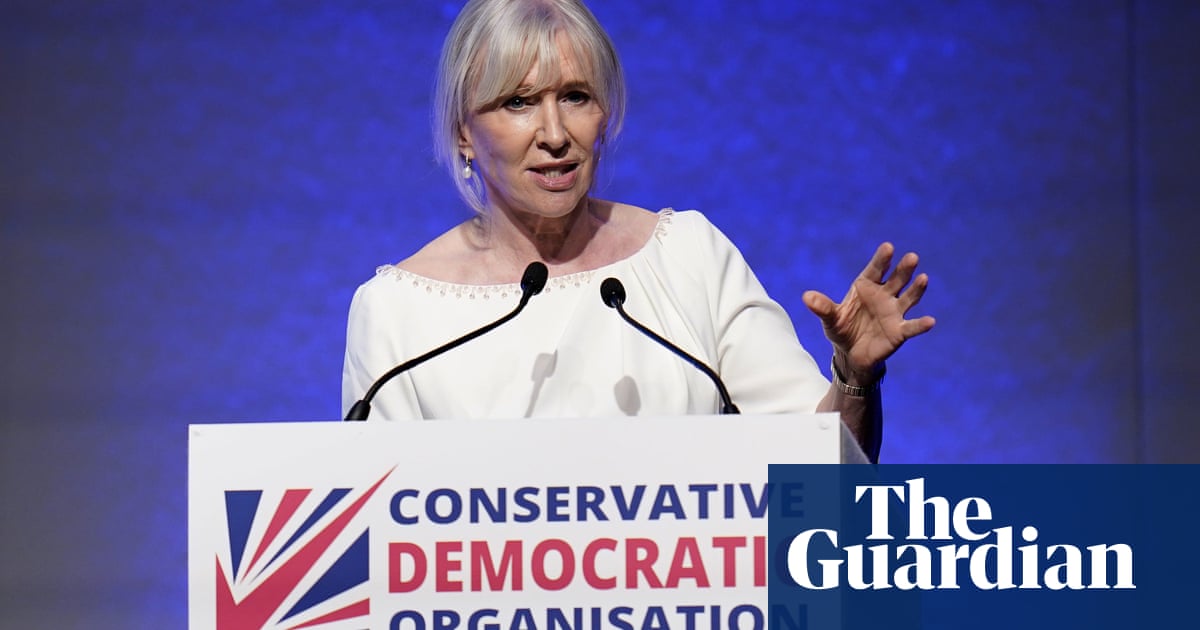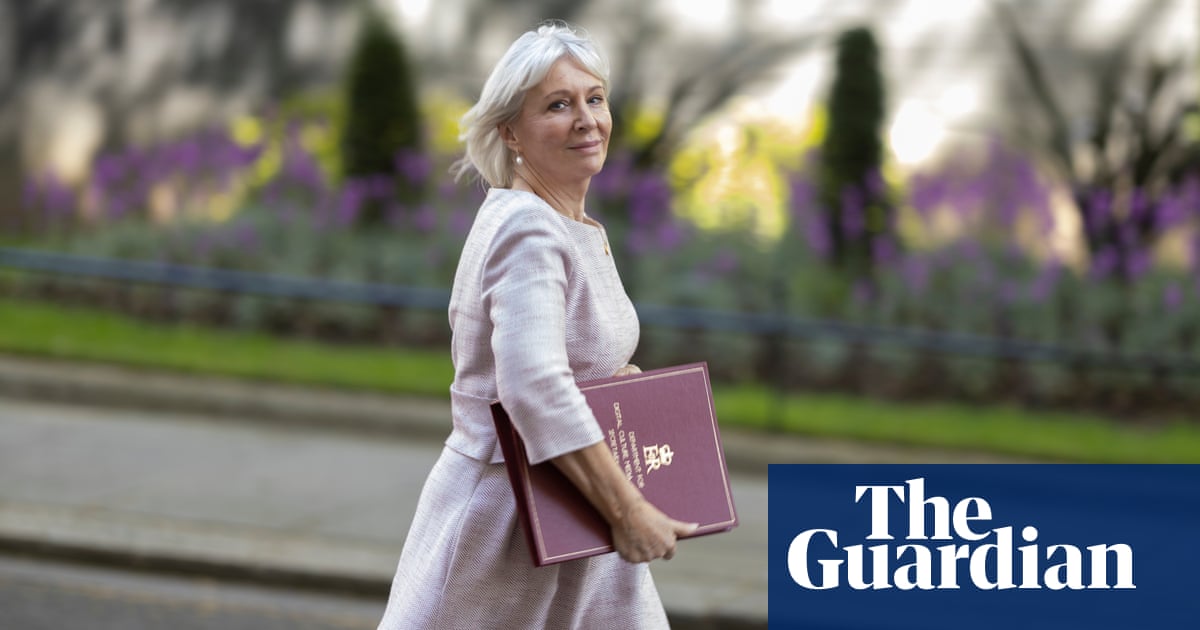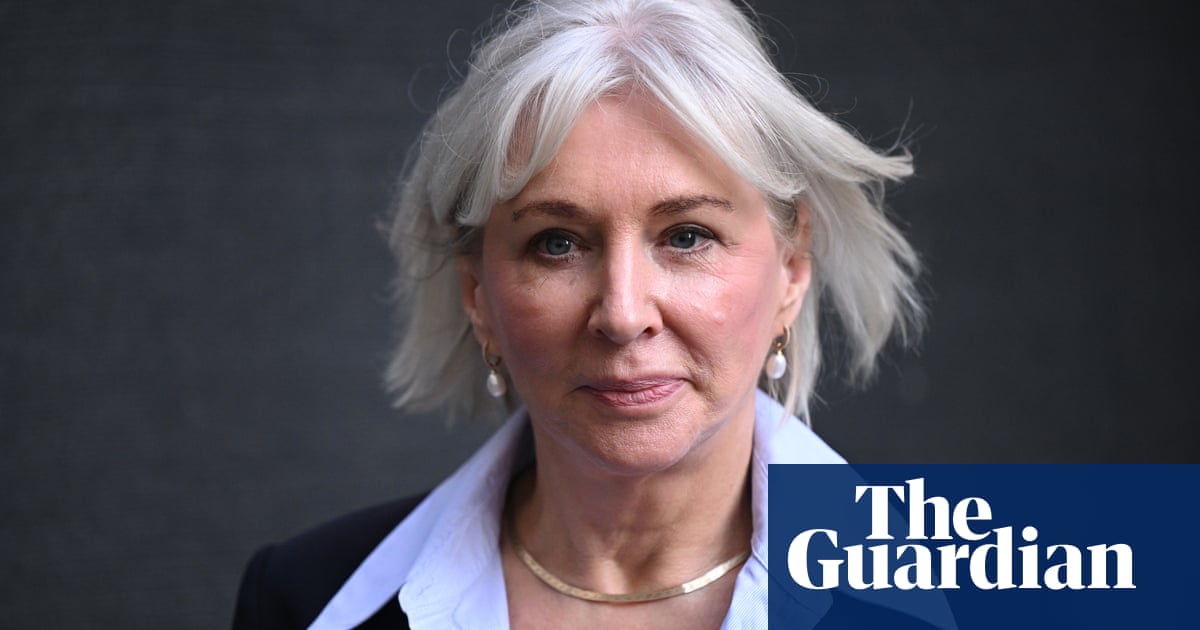
Iam not entirely sure when Nadine Dorries entered my consciousness, but it was a long time before she – and this remains something that strongly resembles a fever dream – became a secretary of state. It might have been back in 2010, when she professed in a New Statesman interview to “totally admire” Sarah Palin. Perhaps it was earlier, in 2008, when she referred on her blog to an anti-abortion conspiracy theory, speculating that 21-week-old foetuses could punch their way out of the womb.
Maybe it was when she was criticised by the standards committee after admitting that her blog, aimed at updating her constituents, was in fact “70% fiction” (her words), but then later wrote on the same blog that “everything on the blog is accurate”, which presumably was part of the 70%. Was it when she compared the Telegraph’s investigation into MPs’ expenses to coming close to a McCarthyite witch-hunt? (She appears keen on accusations of witch-hunts.)
Whatever, I was au fait with the member for Mid Bedfordshire by the time she had the whip suspended in 2012 for being the first sitting MP to appear on I’m A Celebrity … Her take on the report into the investigation by the standards committee on that particular occasion? “Witch-hunt”, obviously. At this point, Dorries really should have become known as the honourable member for Salem. Although she did fully and unreservedly apologise.
In the 18 years Dorries has been in parliament, she has never been far from the headlines. In many ways, she could be seen as the politician who defines our time: a human-microcosm of conspiracy theories (punching foetuses, witch-hunts); disrespect for parliamentary procedure (interminable); astonishing incompetence and ignorance (as culture secretary she appeared not to realise that Channel 4 was not publicly funded, suggesting it was in receipt of public money; and she’s a leading Brexiter who seemed confused about how the customs union worked).
Dorries appears to be a hypocrite (decrying nepotism but employing both of her daughters; mocking James O’Brien for attending the same private school her daughters did); a key protagonist of tedious culture wars (threatening the BBC; getting enraged by statues); a frequent giver of car-crash interviews (including one from a loft conversion: a snarling, peroxide Bertha Rochester); and the poster girl for an unfathomable, craven loyalty to Boris Johnson, a man whose entire personality is not knowing the meaning of the word.
It is especially curious that Dorries, whose almost immediate and refreshing calling out of David Cameron and George Osborne as “arrogant posh boys who don’t know the price of milk”, would end up besties with Old Etonions Johnson and Jacob Rees-Mogg. Though Dorries mentions her childhood growing up on an Anfield council estate more times than Sajid Javid and Sadiq Khan flag their bus-driver fathers, it is without doubt immensely important that people from such backgrounds are becoming less anomalous in politics. Dorries very much should be – and is – proud of her achievements. After working as a nurse, she built a successful childcare business, and she has sold 3m novels – even if the cover designs do suggest they’ve been solely bought as last-minute Christmas presents for nans.
Dorries, then, is both permanently in-your-face and something of an enigma. Genuinely dangerous when part of a government that attacked our institutions, whether legislative, cultural or executive, but with sympathetic and admirable elements to her character. She has overcome tragedy and adversity: she found her father’s body at age 20; a brother died in a road accident; her husband died in 2019. She has struggled with dyslexia. Her strong views on abortion term limits are, she says, a result of her nursing experiences, when she witnessed botched terminations.
She can be personable and witty. Once asked what, exactly, a “lefty snowflake” was, she replied without missing a beat: “Probably my kids.” She can be kind, as when she came to the aid of a Sky cameraman. But I routinely shudder that the two most prominent politicians from my home city, Liverpool, are Dorries and Esther McVey. I have no idea how Dorries, who grew up in grinding poverty, came to the decision that the answer to abolishing grinding poverty and crushing deprivation is the party responsible for grinding poverty and crushing deprivation. A woman who had to borrow school shoes has voted consistently against increasing benefits in line with inflation; for the bedroom tax; against public funding to help long-term unemployed youth.
She rails against the establishment or those born with a silver spoon, and yet votes consistently to make them better off: for reductions in capital gains tax; against the mansion tax. Incensed at being denied a place in the Lords as a working-class girl made good, Dorries voted against removing hereditary peers.
Dorries has, it seems, supremely pettily – although in fairness I am a big fan of pettiness – delayed her actual resignation to inflict maximum damage on Rishi Sunak. But there is no chance she will disappear when she does step down. Following the well-worn path of populist politicians moving on to shock-jockism (or vice versa), Dorries now has a TalkTV show and Daily Mail column. She’s also writing a book with the working title The Political Assassination of Boris Johnson, despite the fact his 1,000-word rant is in fact the new record holder for the longest suicide note in history.
In an interview with the Financial Times published on Friday, Dorries argued that she was “smarter than the guys in No 10”, and the thing is, she does occupy that curious category of person where you are never quite sure: do they believe this stuff? Are they genuinely this morally barren, this intellectually vapid?
Unfortunately, there’s an abundance of evidence for a “yes” on all accounts. You have to remember the time she talked of a “tidal wave of immigrants from Yugoslavia” – a country that ceased to exist in 1992. And that she voted against gay marriage (in mitigation, she has since spoken of her regret), and asked, if the majority of Brits want the death penalty, “why should they not have it?”
Dorries may be far from the most odious person to occupy the Commons, but her legacy will, I’m afraid, be that of a politician who has played a leading role for more than a decade in the destruction of a country that is now despairing domestically – and a laughing stock abroad.
Hannah Jane Parkinson is a Guardian columnist












